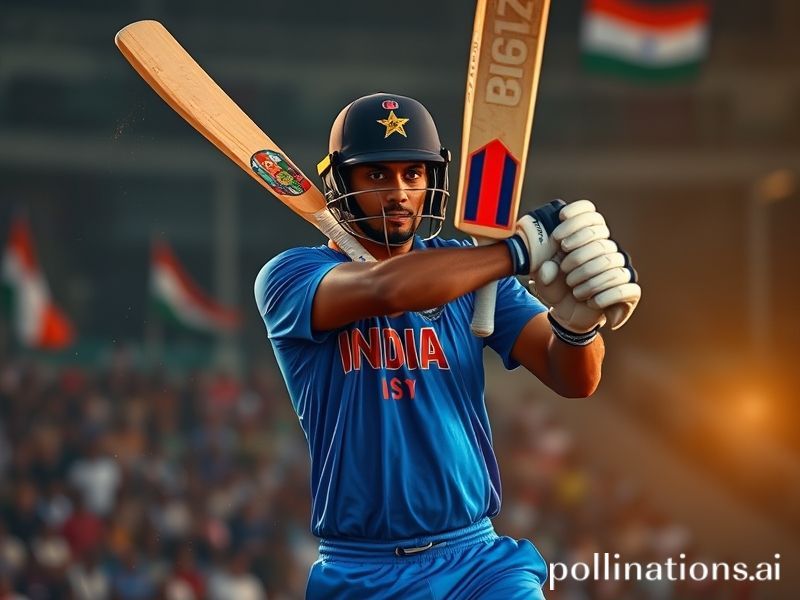Shubman Gill: India’s Billion-Dollar Smile and the Global Economy’s Accidental Pacifier
Shubman Gill: The Accidental Messiah of a Nation That Can’t Decide Whether It Needs Saving or a Netflix Subscription
By Our Correspondent, still recovering from a 3 a.m. doom-scroll in economy class
NEW DELHI—In the blue haze of Narendra Modi Stadium—capacity 132,000, or roughly the population of Reykjavik poured into a concrete cereal bowl—Shubman Gill flicked a 145-kph thunderbolt over third man for six and 1.3 billion people exhaled in unison. The shot itself was clinically gorgeous, the kind of wristy geometry that would make Euclid update his profile pic. But the global resonance was uglier, funnier, and far more useful if you’re in the market for metaphors about late-stage capitalism.
Consider the metrics: Gill’s Instagram following (12.4 million and climbing faster than Sri Lankan inflation) now eclipses the population of Sweden. His bat sponsorship is reportedly worth US $4 million, or about half of what the World Food Programme begged Elon Musk for in 2021 to avert famine in Yemen. Somewhere in Davos, a brand consultant just billed 800 Swiss francs an hour to explain why this juxtaposition is “authentic Gen-Z engagement.”
The planet, of course, has bigger headaches. Europe is reheating 1930s nationalism with TikTok choreography, Antarctic ice shelves are calving like stressed-out dairy cows, and the global middle class is learning that “quiet quitting” is just unemployment with scented candles. Yet a 24-year-old Punjabi with shampoo-commercial hair is being marketed as the subcontinent’s emotional life-raft. If that strikes you as medically insane, congratulations: you still possess a pulse and a library card.
Cricket’s real magic has always been its talent for monetizing hope. The Indian Premier League—part gladiator circus, part crypto-bro reunion—rakes in US $8 billion per season, a sum the UN estimates could vaccinate every child in Sudan twice and still leave change for brunch. Gill, currently the tournament’s top scorer, is therefore a walking balance sheet. Every cover drive adds zeros to broadcast rights already negotiated in Singaporean boardrooms where no one can name the prime minister of Nepal.
Overseas, the reaction oscillates between polite curiosity and anthropological horror. In London, where the Metropolitan Police just warned that climate protests will be prosecuted like al-Qaeda reunions, BBC headline writers treat Gill’s centuries as exotic weather events—“Moist air mass reaches Rajasthan, also chap hits ball.” Meanwhile American sports outlets, freshly traumatized by the bankruptcy of their regional-banking-slash-regional-baseball model, wonder if cricket can become “the next pickleball.” Translation: can we franchise it, juice it with private equity, and sell the streaming rights to a nation that still thinks “LBW” is a Korean boy band?
The geopolitical subplot is richer than a butter chicken smoothie. Last month the BCCI (Board of Control for Cricket in India) politely informed Cricket Australia that next winter’s tour might be “abbreviated” if Canberra keeps whimpering about human rights in Kashmir. Translation: Gill could score a double-century in Perth and still be deployed as a diplomatic bargaining chip. Picture Xi Jinping holding panda memos, only with more spandex.
But let us not burden the boy with the sins of the fathers—or, in this case, with the balance sheets of the uncles. Gill’s own origin story is absurdly cinematic: son of a Fazilka farmer who installed a turf pitch next to the mango orchard because the nearest academy was 150 km away. That detail plays well at UNESCO galas, especially when narrated over a PowerPoint slide titled “South Asian Resilience.” Less mentioned is the part where dad sold ancestral land to fund travel tournaments, a transaction that would make a Greek economist blush. In any other G-20 country this would trigger a parliamentary inquiry on predatory parenting; here it becomes an HDFC Life commercial about filial sacrifice set to a swelling AR Rahman remix.
What happens next is depressingly predictable. Should India win the 2024 T20 World Cup, expect a temporary 0.3 % bump in GDP courtesy of jersey sales and drunk-dialling nostalgia. Should Gill fail in the semifinal, he’ll discover that the same WhatsApp university that anointed him Lord Ram’s second cousin can redact sainthood faster than you can say “biopic starring Ranveer Singh.” Either way, the stadium lights will keep blazing, powered by coal plants that ensure the sea will swallow Fazilka’s mango trees sometime around 2047—roughly when Gill’s own son will be old enough to ask why dad’s highlight reels buffer slower than Himalayan glaciers.
Until then, we watch: a planet glued to a 22-yard strip of grass, praying a kid with a £1,200 bat can postpone our collective appointment with therapy. It’s not his fault we’re like this; he just swings the willow while the rest of us swing between dopamine and debt. And if that isn’t the most late-capitalist prayer ritual ever devised, may I interest you in an NFT of the ball he just launched into orbit? Starting bid: one year of global literacy programs, or your soul—whichever bounces less.







